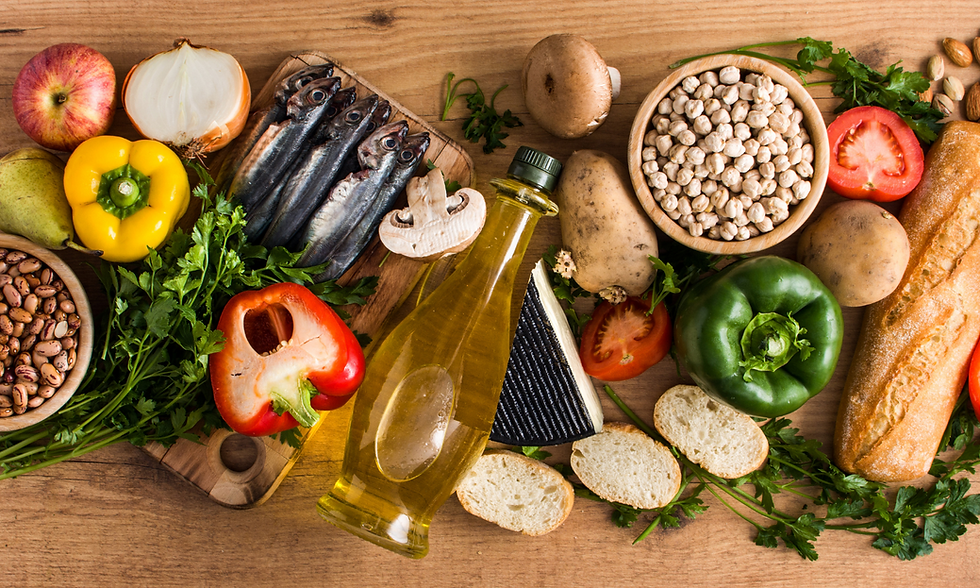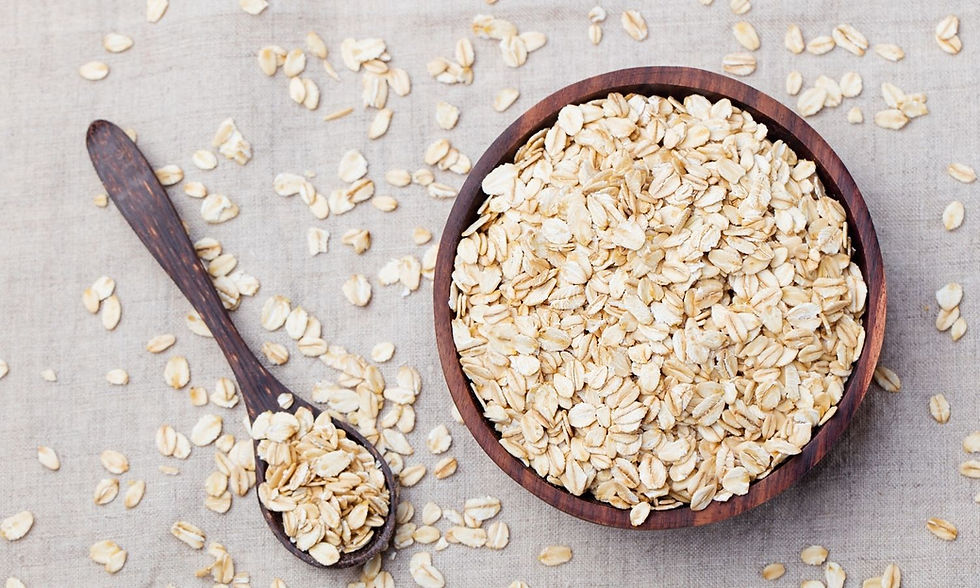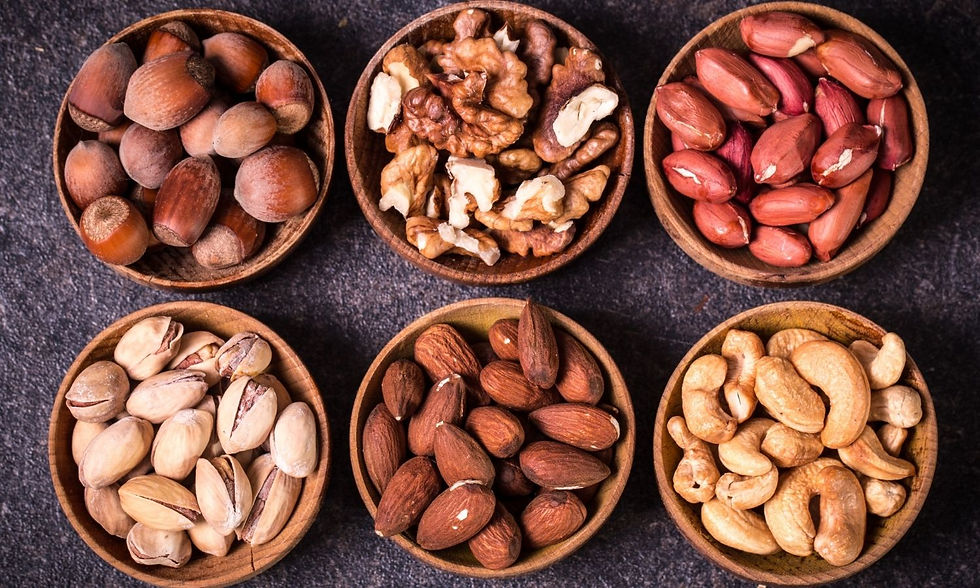What is the Mediterranean Diet?
- Surecell

- Nov 21, 2020
- 10 min read
Updated: Sep 13, 2021

Introduction
Many chronic medical conditions are related to our lifestyle and environment, not just our genetic make-up.(1) Maintaining a healthy weight is one of the most effective ways of reducing our risk of medical conditions, such as high blood pressure, type 2 diabetes, high cholesterol, heart disease and some cancers.(2, 3) Weight maintenance requires that energy expenditure is equivalent to energy intake.(4, 5) People can lose weight by reducing energy intake in their diet to below their energy output through physical activity.(6, 7) People aiming to gain weight can increase energy intake so that it exceeds energy expenditure.
Diet versus Nutrition guideline
Whether we are looking to maintain, lose or gain weight, the types of foods we eat also play a major role in our health.(8) This is where the concept of diet comes in. Think of a diet more as a long-term nutrition guideline, rather than a strict short-term calorie-counting regime. There are many types of dietary guidelines for weight and health maintenance that scientists have studied. These include low-fat diets, low-cholesterol diets, vegetarian diets, DASH (dietary approaches to stop hypertension) diets, organic diets and the Mediterranean diets. Today, the focus will be on the Mediterranean diet.
What is the Mediterranean diet?
There exists no official definition of the Mediterranean diet. Typically, a Mediterranean diet:(9-14)
Is high in fruits, vegetables, whole grains, beans, nuts and seeds
Includes olive oil as a source of monounsaturated fat
Allows low to moderate wine consumption
Contains low to moderate amounts of fish, poultry, dairy products
Permits low levels of red meat consumption
It is unclear whether the beneficial effects of the Mediterranean diet stem from the diet as a whole, or from specific components of the diet.
Effects of the Mediterranean diet
Evidence suggests that the Mediterranean diet reduces the risk of stroke compared to a standard low-fat diet.(10) Note that low-fat diets require that fat contributes to less than 30% of your energy intake, which increases energy consumption and promotes fat loss.(15) The Mediterranean diet does not have this requirement. Observational studies have found that the Mediterranean diet is associated with lower overall death rates and death from heart disease.(9, 14) Further studies have found that the Mediterranean diet is associated with reduced rates of Parkinson’s disease, Alzheimer’s disease, and a number of cancers, including bowel, prostate, aerodigestive (lips, mouth, nose and throat) and breast.(13, 14) Additionally, patients with type 2 diabetes also have improved blood sugar control when they are following a Mediterranean eating plan.(11)
Components of the Mediterranean diet
High levels of:
> Fruits and vegetables
Increased fruit and vegetable intake is associated with lower rates of death, heart disease and some cancers.(16-20) A standard 2000-calorie diet should incorporate two daily servings of fruit daily and 3 servings of vegetables.(21) It is possible that whole fruits and vegetables protect against death, heart disease and stroke due to their high fibre content.(22, 23) Higher intakes of fruits and vegetables are also associated with a lower risk of aerodigestive cancers and certain types of breast cancer.(24)

> Whole grains
Increased consumption of whole grains is associated with improved weight management, reduced death from heart disease, reduced death from all causes, and reduced risk of heart disease and cancer.(25-27) Whole-grain foods include brown rice, whole-grain bread, whole-grain cereal and oatmeal. Whole-grains have lots of fibre, iron, B-vitamins and other nutrients and have a low glycemic index.(23) At least one half of daily grain intake should be from whole grains.(28)
> Beans
A healthy source of protein, beans can replace servings of proteins that contain unhealthy fats, such as red meat and processed meat.(28)

> Nuts
Nuts are protein-rich and associated with weight loss. Consumption is also tied with reduced heart disease and stroke.(29) Aim to eat a serving of nuts five or more times per week.(28)
> Seeds
Seed are another rich plant-based source of protein.(28)
Low-to-moderate levels of:
> Olive oil
Olive oil is an important source of monounsaturated fat in the Mediterranean diet.(10)
> Wine
Alcohol is optional and should be consumed in moderation. Guidelines recommend no more than one drink per day for women and two drinks per day for men.(28)
> Fish
Fish and seafood contain protein, vitamins and minerals, including omega-3 polyunsaturated fatty acids.(28) One to two servings of oily fish per week is suggested for most adult patients. A large analysis found that fish consumption at least 4 times per week was associated with reduced risk of blockages in the blood vessels supplying the heart.(30)

> Poultry
White poultry is a healthy source of protein. Poultry can contribute to the 2-3 servings of protein per day recommended in a 2000-calorie diet.(28)
> Dairy
Dairy products are an important source of calcium and vitamin D. Dairy includes animal milk or products made from animal milk, such as cheese and yoghurt.(28) Consumption of three cups of dairy products per day is important for bone health.(31) Dairy intake lowers the risk of colorectal cancer and may reduce the risk of heart disease.(24)
Low levels of:
> Red meat.
Minimise red meat and processed meats. Red meat is associated with weight gain.(25) Large analyses have found that increased consumption of red and processed meat is associated with higher risk of type 2 diabetes, stroke, colorectal cancer and death from heart disease.(32-39)
None of:
> Sweetened beverages
These include fruit drinks, sports drinks, energy drinks and soft drinks. Sweetened beverages contain refined sugars, which should contribute no more than 10% of total calories consumed.(28) These drinks have played a key role in the weight gain and obesity epidemic.(40) Sweetened beverages are also associated with lower intake of key nutrients because they take the place of nutrient-dense foods.(41) They increase the risk of heart disease, type 2 diabetes, high blood pressure.(42-45)
Coffee
Coffee seems to lower the risk of liver and uterine cancers.(24) Up to 400mg/day of caffeine can be incorporated into a healthy diet.(28)

Don’t forget exercise
Evidence suggests that at least 30 minutes of exercise 5-7 days per week prevents weight gain and improves heart health.(46, 47) To lose weight, you should exercise alongside lower energy intake to augment the effects of a healthy diet and to improve muscle mass.(48) Physical activity should be maintained if attempting to gain weight.(49)
Recommendations
Overall, management of weight through diet and exercise requires a lifestyle change. Major changes to your diet and exercise should occur with professional guidance. At Surecell, we can provide tailored education and support as you alter your daily habits. We recommend a variety of nutrition and exercise options to manage weight and health. Even if you are not overweight, settling on a routine of healthy meals and enjoyable aerobic and strength training on most days will benefit your general health.
Support available at Surecell
If you are looking for a tailored nutrition and exercise plan, we offer exercise physiology, personal training and gym facilities, nutrition advice, as well as medical support. Our Surecell doctors are musculoskeletal experts who provide regenerative medicine treatments for osteoarthritis, such as platelet-rich plasma (PRP). Feel free to contact our friendly staff on 03 9822 9996 or submit an enquiry here.
References
Bray GA, Kim KK, Wilding JPH, World Obesity F. Obesity: a chronic relapsing progressive disease process. A position statement of the World Obesity Federation. Obes Rev. 2017;18(7):715-23.
Adams KF, Schatzkin A, Harris TB, Kipnis V, Mouw T, Ballard-Barbash R, et al. Overweight, obesity, and mortality in a large prospective cohort of persons 50 to 71 years old. N Engl J Med. 2006;355(8):763-78.
Renehan AG, Tyson M, Egger M, Heller RF, Zwahlen M. Body-mass index and incidence of cancer: a systematic review and meta-analysis of prospective observational studies. Lancet. 2008;371(9612):569-78.
Irwin ML, Yasui Y, Ulrich CM, Bowen D, Rudolph RE, Schwartz RS, et al. Effect of exercise on total and intra-abdominal body fat in postmenopausal women: a randomized controlled trial. JAMA. 2003;289(3):323-30.
Slentz CA, Duscha BD, Johnson JL, Ketchum K, Aiken LB, Samsa GP, et al. Effects of the amount of exercise on body weight, body composition, and measures of central obesity: STRRIDE--a randomized controlled study. Arch Intern Med. 2004;164(1):31-9.
Sayon-Orea C, Razquin C, Bullo M, Corella D, Fito M, Romaguera D, et al. Effect of a Nutritional and Behavioral Intervention on Energy-Reduced Mediterranean Diet Adherence Among Patients With Metabolic Syndrome: Interim Analysis of the PREDIMED-Plus Randomized Clinical Trial. JAMA. 2019;322(15):1486-99.
Wluka AE, Lombard CB, Cicuttini FM. Tackling obesity in knee osteoarthritis. Nat Rev Rheumatol. 2013;9(4):225-35.
Diet, nutrition and the prevention of chronic diseases. World Health Organ Tech Rep Ser. 2003;916:i-viii, 1-149, backcover.
Ahmad S, Moorthy MV, Demler OV, Hu FB, Ridker PM, Chasman DI, et al. Assessment of Risk Factors and Biomarkers Associated With Risk of Cardiovascular Disease Among Women Consuming a Mediterranean Diet. JAMA Netw Open. 2018;1(8):e185708.
Estruch R, Ros E, Salas-Salvado J, Covas MI, Corella D, Aros F, et al. Primary Prevention of Cardiovascular Disease with a Mediterranean Diet Supplemented with Extra-Virgin Olive Oil or Nuts. N Engl J Med. 2018;378(25):e34.
Huo R, Du T, Xu Y, Xu W, Chen X, Sun K, et al. Effects of Mediterranean-style diet on glycemic control, weight loss and cardiovascular risk factors among type 2 diabetes individuals: a meta-analysis. Eur J Clin Nutr. 2015;69(11):1200-8.
Rees K, Takeda A, Martin N, Ellis L, Wijesekara D, Vepa A, et al. Mediterranean-style diet for the primary and secondary prevention of cardiovascular disease. Cochrane Database Syst Rev. 2019;3:CD009825.
Schwingshackl L, Hoffmann G. Adherence to Mediterranean diet and risk of cancer: a systematic review and meta-analysis of observational studies. Int J Cancer. 2014;135(8):1884-97.
Sofi F, Cesari F, Abbate R, Gensini GF, Casini A. Adherence to Mediterranean diet and health status: meta-analysis. BMJ. 2008;337:a1344.
Hall KD, Guo J. Obesity Energetics: Body Weight Regulation and the Effects of Diet Composition. Gastroenterology. 2017;152(7):1718-27 e3.
Crowe FL, Roddam AW, Key TJ, Appleby PN, Overvad K, Jakobsen MU, et al. Fruit and vegetable intake and mortality from ischaemic heart disease: results from the European Prospective Investigation into Cancer and Nutrition (EPIC)-Heart study. Eur Heart J. 2011;32(10):1235-43.
Joshipura KJ, Ascherio A, Manson JE, Stampfer MJ, Rimm EB, Speizer FE, et al. Fruit and vegetable intake in relation to risk of ischemic stroke. JAMA. 1999;282(13):1233-9.
Miller V, Mente A, Dehghan M, Rangarajan S, Zhang X, Swaminathan S, et al. Fruit, vegetable, and legume intake, and cardiovascular disease and deaths in 18 countries (PURE): a prospective cohort study. Lancet. 2017;390(10107):2037-49.
Nagura J, Iso H, Watanabe Y, Maruyama K, Date C, Toyoshima H, et al. Fruit, vegetable and bean intake and mortality from cardiovascular disease among Japanese men and women: the JACC Study. Br J Nutr. 2009;102(2):285-92.
Wang X, Ouyang Y, Liu J, Zhu M, Zhao G, Bao W, et al. Fruit and vegetable consumption and mortality from all causes, cardiovascular disease, and cancer: systematic review and dose-response meta-analysis of prospective cohort studies. BMJ. 2014;349:g4490.
He FJ, Nowson CA, MacGregor GA. Fruit and vegetable consumption and stroke: meta-analysis of cohort studies. Lancet. 2006;367(9507):320-6.
Pietinen P, Rimm EB, Korhonen P, Hartman AM, Willett WC, Albanes D, et al. Intake of dietary fiber and risk of coronary heart disease in a cohort of Finnish men. The Alpha-Tocopherol, Beta-Carotene Cancer Prevention Study. Circulation. 1996;94(11):2720-7.
Reynolds A, Mann J, Cummings J, Winter N, Mete E, Te Morenga L. Carbohydrate quality and human health: a series of systematic reviews and meta-analyses. Lancet. 2019;393(10170):434-45.
World Cancer Research Fund/American Institute for Cancer Research. Diet, Nutrition, Physical Activity and Cancer: a Global Perspective. Continuous Update Project Expert Report 2018. https://www.wcrf.org/dietandcancer/about (Accessed on November 18, 2020).
Mozaffarian D, Hao T, Rimm EB, Willett WC, Hu FB. Changes in diet and lifestyle and long-term weight gain in women and men. N Engl J Med. 2011;364(25):2392-404.
Tang G, Wang D, Long J, Yang F, Si L. Meta-analysis of the association between whole grain intake and coronary heart disease risk. Am J Cardiol. 2015;115(5):625-9.
Wu H, Flint AJ, Qi Q, van Dam RM, Sampson LA, Rimm EB, et al. Association between dietary whole grain intake and risk of mortality: two large prospective studies in US men and women. JAMA Intern Med. 2015;175(3):373-84.
U.S. Department of Health and Human Services and U.S. Department of Agriculture. 2015 – 2020 Dietary Guidelines for Americans. 8th Edition. December 2015. Available at http://health.gov/dietaryguidelines/2015/guidelines/. (Accessed on November 18, 2020).
Guasch-Ferre M, Liu X, Malik VS, Sun Q, Willett WC, Manson JE, et al. Nut Consumption and Risk of Cardiovascular Disease. J Am Coll Cardiol. 2017;70(20):2519-32.
Leung Yinko SS, Stark KD, Thanassoulis G, Pilote L. Fish consumption and acute coronary syndrome: a meta-analysis. Am J Med. 2014;127(9):848-57 e2.
Nationalacademies.org. 2020 [cited 18 November 2020]. Available from: http://nationalacademies.org/hmd/~/media/Files/Report%20Files/2010/Dietary-Reference-Intakes-for-Calcium-and-Vitamin-D/Vitamin%20D%20and%20Calcium%202010%20Report%20Brief.pdf
Abete I, Romaguera D, Vieira AR, Lopez de Munain A, Norat T. Association between total, processed, red and white meat consumption and all-cause, CVD and IHD mortality: a meta-analysis of cohort studies. Br J Nutr. 2014;112(5):762-75.
Chan DS, Lau R, Aune D, Vieira R, Greenwood DC, Kampman E, et al. Red and processed meat and colorectal cancer incidence: meta-analysis of prospective studies. PLoS One. 2011;6(6):e20456.
Feskens EJ, Sluik D, van Woudenbergh GJ. Meat consumption, diabetes, and its complications. Curr Diab Rep. 2013;13(2):298-306.
Kaluza J, Wolk A, Larsson SC. Red meat consumption and risk of stroke: a meta-analysis of prospective studies. Stroke. 2012;43(10):2556-60.
Larsson SC, Orsini N. Red meat and processed meat consumption and all-cause mortality: a meta-analysis. Am J Epidemiol. 2014;179(3):282-9.
Micha R, Wallace SK, Mozaffarian D. Red and processed meat consumption and risk of incident coronary heart disease, stroke, and diabetes mellitus: a systematic review and meta-analysis. Circulation. 2010;121(21):2271-83.
Wang X, Lin X, Ouyang YY, Liu J, Zhao G, Pan A, et al. Red and processed meat consumption and mortality: dose-response meta-analysis of prospective cohort studies. Public Health Nutr. 2016;19(5):893-905.
Wolk A. Potential health hazards of eating red meat. J Intern Med. 2017;281(2):106-22.
Malik VS, Popkin BM, Bray GA, Despres JP, Willett WC, Hu FB. Sugar-sweetened beverages and risk of metabolic syndrome and type 2 diabetes: a meta-analysis. Diabetes Care. 2010;33(11):2477-83.
Imamura F, O'Connor L, Ye Z, Mursu J, Hayashino Y, Bhupathiraju SN, et al. Consumption of sugar sweetened beverages, artificially sweetened beverages, and fruit juice and incidence of type 2 diabetes: systematic review, meta-analysis, and estimation of population attributable fraction. BMJ. 2015;351:h3576.
de Koning L, Malik VS, Kellogg MD, Rimm EB, Willett WC, Hu FB. Sweetened beverage consumption, incident coronary heart disease, and biomarkers of risk in men. Circulation. 2012;125(14):1735-41, S1.
Greenwood DC, Threapleton DE, Evans CE, Cleghorn CL, Nykjaer C, Woodhead C, et al. Association between sugar-sweetened and artificially sweetened soft drinks and type 2 diabetes: systematic review and dose-response meta-analysis of prospective studies. Br J Nutr. 2014;112(5):725-34.
Jayalath VH, de Souza RJ, Ha V, Mirrahimi A, Blanco-Mejia S, Di Buono M, et al. Sugar-sweetened beverage consumption and incident hypertension: a systematic review and meta-analysis of prospective cohorts. Am J Clin Nutr. 2015;102(4):914-21.
Xi B, Huang Y, Reilly KH, Li S, Zheng R, Barrio-Lopez MT, et al. Sugar-sweetened beverages and risk of hypertension and CVD: a dose-response meta-analysis. Br J Nutr. 2015;113(5):709-17.
Messier SP, Mihalko SL, Legault C, Miller GD, Nicklas BJ, DeVita P, et al. Effects of intensive diet and exercise on knee joint loads, inflammation, and clinical outcomes among overweight and obese adults with knee osteoarthritis: the IDEA randomized clinical trial. JAMA. 2013;310(12):1263-73.
Tsai AG, Wadden TA. The evolution of very-low-calorie diets: an update and meta-analysis. Obesity (Silver Spring). 2006;14(8):1283-93.
Johnson VL, Hunter DJ. The epidemiology of osteoarthritis. Best Pract Res Clin Rheumatol. 2014;28(1):5-15.
Kodama S, Saito K, Tanaka S, Maki M, Yachi Y, Asumi M, et al. Cardiorespiratory fitness as a quantitative predictor of all-cause mortality and cardiovascular events in healthy men and women: a meta-analysis. JAMA. 2009;301(19):2024-35.




Comentarios